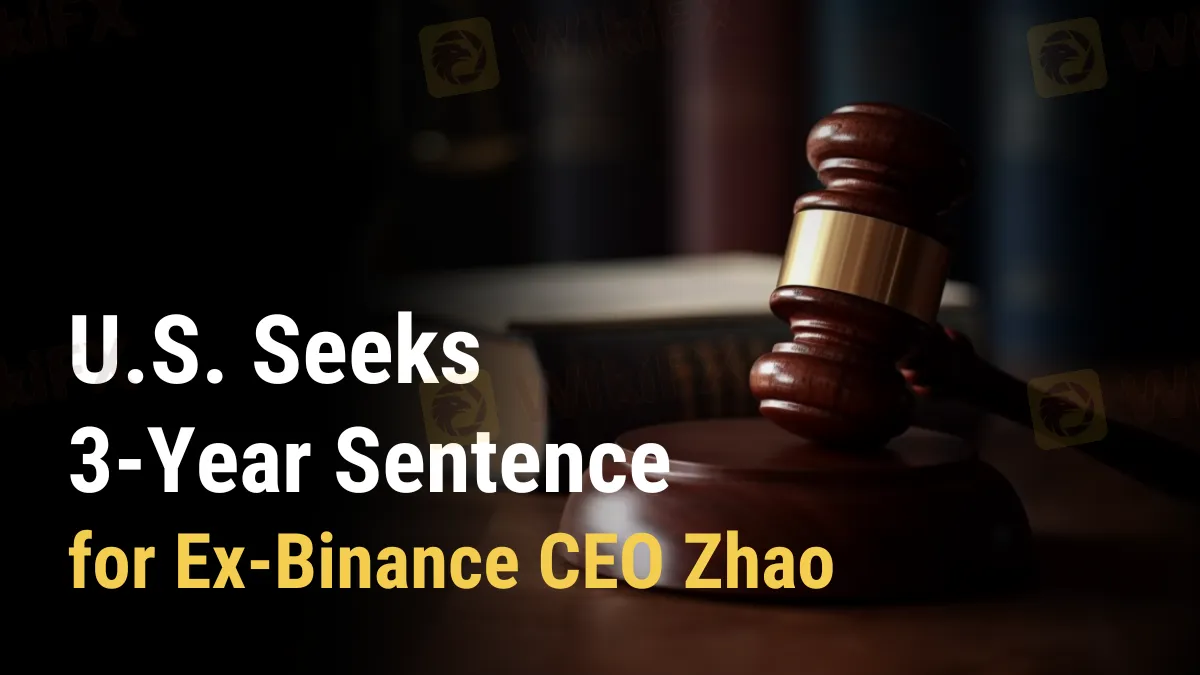简体中文
繁體中文
English
Pусский
日本語
ภาษาไทย
Tiếng Việt
Bahasa Indonesia
Español
हिन्दी
Filippiiniläinen
Français
Deutsch
Português
Türkçe
한국어
العربية
U.S. Seeks 3-Year Sentence for Ex-Binance CEO Zhao
Abstract:Former Binance CEO faces a potential 36-month sentence in the U.S. for money laundering. Prosecutors cite the gravity of crimes and the need for deterrence.

Changpeng Zhao, the former CEO of the renowned cryptocurrency exchange Binance, is being pressured by U.S. prosecutors to serve a 36-month prison term. This action was prompted by a sentencing letter received late Tuesday by the western district of Washington, which detailed the charges of money laundering facilitation.
According to the memorandum, Zhao's conduct warrants a sentence greater than the advisory standards, which normally vary from 12 to 18 months. A 36-month sentence, according to the prosecution, would accomplish the sentencing objectives without being too punitive, maintain respect for the law, highlight the gravity of the conduct, and discourage similar offenses in the future.
The Bank Secrecy Act requires Zhao to develop a successful anti-money laundering program, which he allegedly failed to do. He is also claimed to have allowed Binance to handle transactions with illicit proceeds, particularly those involving Americans and others from embargoed nations.

The Commodity Futures Trading Commission and the SEC have filed complaints against Binance, which has been in legal conflicts. These fines followed allegations of illegally operating an unlicensed U.S. exchange and unscrupulous customer asset management. Zhao agreed to pay $50 million, while Binance was fined $4.3 billion.
Following the plea deal, Zhao resigned as CEO of Binance in November, and Richard Teng took over. Inquiries were made to Zhao and Binance, but they did not respond.
Zhao's actions, according to the prosecution, indicate an “unprecedented scale” of financial crime, and they denounce his apparent disregard for the law. They believe Zhao oversaw Binance's risky actions, which were reminiscent of the “Wild West,” with Zhao wagering on avoiding detection and suffering as few consequences as possible.
But now that Zhao is in legal hot water, the court will decide what punishments are fitting for his behavior. The court will consider Zhao's misdeeds and the necessity of deterrence in the cryptocurrency industry when determining his formal sentence on April 30.
In summary, Zhao's 36-month sentence shows how seriously authorities take financial crimes against the Bitcoin industry. The legal obligations that CEOs of bitcoin exchanges have been brought to light by this case, as are the consequences of discharging these obligations.

Disclaimer:
The views in this article only represent the author's personal views, and do not constitute investment advice on this platform. This platform does not guarantee the accuracy, completeness and timeliness of the information in the article, and will not be liable for any loss caused by the use of or reliance on the information in the article.
Read more

Coinbase Under Scrutiny Amid Wrapped Bitcoin Delisting Controversy
Coinbase has come under fire after announcing its decision to delist Wrapped Bitcoin (wBTC), a move critics claim could be driven by competitive interests. The delisting, set to take effect on 19 December, has sparked allegations of market manipulation and concerns about fairness in the cryptocurrency ecosystem.

Solana Soars to All-Time High, Hits $264 on Coinbase
Solana hits $264 on Coinbase, breaking its 3-year high with an 11% daily surge. Learn what’s driving SOL's meteoric rise and the crypto market rally.

Mastercard Partners with JPMorgan for B2B Cross-Border Payments
Mastercard and JPMorgan's Kinexys Digital Payments join forces to enhance B2B cross-border payments, promising faster settlements and greater transparency.

Bitcoin Nears $100,000: A Triumph of Optimism or a Warning Sign?
Bitcoin’s meteoric rise continues to capture global attention as its price recently surpassed the $99,000 mark, briefly approaching the $100,000 milestone. This unprecedented rally has led market sentiment to reach a state of “extreme greed,” according to the Fear and Greed Index. Analysts suggest that the market may be entering overheated territory, raising questions about sustainability amidst ongoing enthusiasm.
WikiFX Broker
Latest News
Webull Partners with Coinbase to Offer Crypto Futures
eToro Expands Nationwide Access with New York Launch
Why Is UK Inflation Rising Again Despite Recent Lows?
Hackers Charged for $11M Crypto Theft Using SIM-Swaps
Role of Central Banks in the FX Market
FCA Alerts Against Sydney FX
What Makes Cross-Border Payments Easier Than Ever?
Trader Exposes Unethical Practices by STP Trading
Interactive Brokers Launches Tax-Friendly PEA Accounts in France
Google Warns of New Deepfake Scams and Crypto Fraud
Currency Calculator


